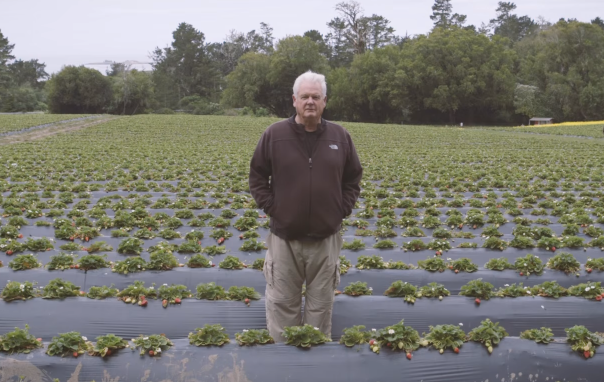
Poisoned By Pesticides: How One Farmer Changed Trial Into Triumph With Organic Crops
Brianna Blaschke

After being poisoned by his own pesticides, strawberry farmer Jim Cochran went against the grain, earning him the title of owning the first large-scale organic strawberry farm.
In recent years, the extent of which “conventional” agricultural methods cause serious harm has been brought to light, with countless examples of the detriment chemical usage on crops creates.
Jim Cochran, a strawberry farmer based in Santa Cruz, California, is a perfect case in point. Back in 1981, Cochran followed his fellow farmers in growing conventional strawberries, complete with harmful pesticides. However, he soon found that the chemicals had an adverse effect on his body and his mind.
“My eyes started to water, and I started to get all jittery,” he states. “I said ‘Oh boy, this is not good stuff…We have to get away from this stuff.”
Similar to about 10-20,000 other American farm workers, Cochran found himself poisoned by pesticides, suffering from neurological issues for months. Deciding to take a stand, he defied convention and decided to grow organic strawberries; his fellow farmers did not believe that to be possible at the time.
Fast forward 35 years and Cochran oversees a thriving organic farm called Swanton Berry Farm, earning numerous visitors curious about the country’s first large-scale commercial organic strawberry grower.
His secret? Cochran has turned away from chemical use and instead relies on beneficial bugs, single row planting, crop rotations, and other classic techniques; these old-school methods have become virtually extinct in the era of chemical-intensive farming, yet have proven to be very effective.
Cochran strives to reveal the truth about pesticide-reliant crops, of which strawberries are a high-profile case. He revealed that an acre of non-organic strawberries uses 300 pounds of pesticides, which is about 1,100 percent more than most crops. According to Prevention, dangerous chemicals are still heavily used on strawberries. Methyl bromide, chloropicrin, and Telone (1,3-D) have all been linked to cancer, developmental problems, and hormone disruption.
Senior Scientist with Pesticide Action Network Margaret Reeves, PhD., warns that current regulations are simply not enough; with “over 5.5 million pounds of chloropicrin” used in California alone. Strawberries were found to have 54 different pesticides, all of which can have irreparable damage to human health and the health of the environment.
Despite the steps taken by farmers like Cochran and researchers like Reeves, the organic strawberry farming industry still has a lot of work in store. Current state and federal law allows for farmers to buy fumigated – a form of pesticide that has been linked to cancer and developmental issues – species and still call them organic. Because of this, Cochran stresses the importance of knowing the right questions to ask and understanding the true meaning of organic.
You can learn more about Cochran’s unique method of farming, including treatment of his staff, in this video below.
SEE THE VIDEO
